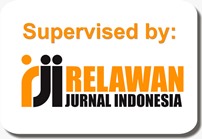INFLUENCE OF EDUCATIONAL LEVELS AND SMALL AND MEDIUM ENTERPRISES PERCEPTION TO USE SAK-ETAP ON SMALL AND MEDIUM ENTERPRISES IN BATAM CITY
Abstract
Small-medium enterprises have an important role in Indonesia economy, especially in Batam City. There are few problems in these enterprise, especially in the management of financial statements. This is due to the low level of education and the lack of perceptions of small-medium enterprises. In terms of management of financial statements, the government has issued SAK ETAP (Financial Accounting Standards Entity Without Public Accountanbility) to facilitate small-medium enterprises in managing financial statements. This research is done with the aim to know the influence of education level and perception of small- medium enterprises to the use of SAK ETAP SMEs in Batam City. Data collection techniques with questionnaires distributed to 300 respondent who are samples in this study. Respondent in this study are the small-medium enterprises located in Batam City. Data analysis using multiple linear regression analysis with SPSS version 21 software. The coefficient of determination value of this research is 3,6%. The result of t test is that the variable of education level have affect to the use of SAK ETAP equal to 0,003 less than 0,05 and t value 3,000 bigger than t value table 1,9679. While the perception variable does not affect the use of SAK ETAP because 0,219 is greater than 0,05 and the value of t arithmetic 1,231 is smaller than t value table 1,9679. The result of F-test show that the level of education and perception together have affect on the use of SAK ETAP of 0,004 is smaller than 0,05 and the value of F arithmetic 5,522 is greater than F table 3,0258.
Key word: Small Medium Enterprises (SME), Education Level, Perception, use of SAK ETAP
Full Text:
PDFReferences
Afianti, P. P. (2013). Faktor-Faktor Yang Mempengaruhi Penerapan Standar Akuntansi Keuangan Entitas Tanpa Akuntabilitas Publik (SAK ETAP) Pada UMKM Di Kabupaten Bogor, 4(2), 1–22.
Arwani, A. (2016). Akuntansi Perbankan Syari’ah (1st ed.). Yogyakarta: Deepublish.
Bahri, S. (2016). Pengantar Akuntansi Berdasarkan SAK ETAP Dan IFRS. (E. Risanto, Ed.). Yogyakarta: CV. Andi Offset.
Daryanto. (2014). Teori Komunikasi (1st ed.). Malang: Anggota IKAPI.
Dewi, N. A. P. U., Yuniarta, G. A., & Wahyuni, M. A. (2017). Pengaruh Sosialisasi SAK ETAP, Tingkat Pendidikan Pemilik, Dan Persepsi Pelaku UKM Terhadap Penggunaan SAK ETAP Pada UKM Di Kecamatan Buleleng, 7(1).
Edison, & Acep. (2015). Modul Pratikum: Metode Riset Untuk Bisnis & Manajemen. Bandung: Universitas Widyatama.
Ghozali, I. (2013). Aplikasi Analisis Multivariete Dengan Program IBM SPSS 23 (8th ed.). Semarang: Badan Penerbit Universitas Diponegoro.
Hery. (2015). Analisis Laporan Keuangan Pendekatan Rasio Keuangam. (T. Admojo, Ed.) (1st ed.). Yogyakarta: CAPS (Center for Academic Publishing Service).
Indonesia, I. A. (2016). SAK ETAP (Standar Akuntansi Keuangan Entitas Tanpa Akuntabilitas Publik).
Kadir, A., Yulianto, E., Kurnianto, R., Fauzi, A., Baehaqi, Rosmiati, & Nu’man, A. (2012). Dasar - Dasar Pendidikan (1st ed.). Jakarta: Prenada Media Group.
Mukhtar, H., Ali, H., & Mardalena. (2016). Efektivitas Pimpinan: Kepemimpinan Transformatif Dan Komitmen Organisasi (1st ed.). Yogyakarta: Deepublish.
Nayla, A. P. (2014). Komplet Akuntansi Untuk UKM Dan Waralaba. (P. Erine, Ed.) (1st ed.). Jogjakarta: Laksana.
Nazir, Mohammad, P. . (2011). Metodologi Penelitian. Jakarta: Ghalia Indonesia.
Santoso, S. (2012). Analisis SPSS Pada Statistik Parametrik. Jakarta: PT Elex Media Komputindo.
Sofiah, N., & Murniati, A. (2014). Persepsi Pengusaha UMKM Keramik Dinoyo Atas Informasi Akuntansi Keuangan Berbasis Entitas Tanpa Akuntabilitas Publik (SAK ETAP). JIBEKA, 8(1), 1–8.
Soraya, E. A., & Mahmud, A. (2016). Faktor - Faktor Yang Mempengaruhi Kebutuhan Standar Akuntansi Keuangan Entitas Tanpa Akuntabilitas Publik. ISSN 2252 - 6765, 5(1), 1–8.
Sudrajat, U., & Sujawi. (2018). Ekonomi Manajerial. (P. Dewi, Ed.) (1st ed.). Yogyakarta: Deepublish.
Sugiyono. (2015). Metode Penelitian Kuantitatif, Kualitatif, Kombinasi (Mixed Methods) (7th ed.). Bandung: Alfabeta, CV.
Sujarweni, V. W. (2017). Analisis Laporan Keuangan Teori, Aplikasi, & Hasil Penelitian. Yogyakarta: Pustaka Baru Press.
Sukendar, M. U. (2017). Psikologi Komunikasi: Teori Dan Praktek (1st ed.). Yogyakarta: Deepublish.
Sutrisno, A. N. (2014). Filsafat Pendidikan (Revisi). Yogyakarta: Deepublish.
Tarmizi, R., & Bugawanti, N. L. S. (2013). Pengaruh Persepsi Pengusaha Kecil dan Menengah Terhadap Penggunaan SAK ETAP Di Kota Bandar Lampung. ISSN 2087 - 2054, 5(2).
Undang - Undang Republik Indonesia Nomor 20 Tahun 2008 Tentang Usaha Mikro, Kecil, Dan Menengah. (2008).
Zulfikar, & Budiantara, N. (2014). Manajemen Riset Dengan Pendekatan Komputasi Statistika (1st ed.). Yogyakarta: Deepublish.
DOI: https://doi.org/10.31846/jae.v6i2.72
Refbacks
- There are currently no refbacks.

This work is licensed under a Creative Commons Attribution-NonCommercial-NoDerivatives 4.0 International License.
e-Jurnal Apresiasi Ekonnomi Indexed by:












